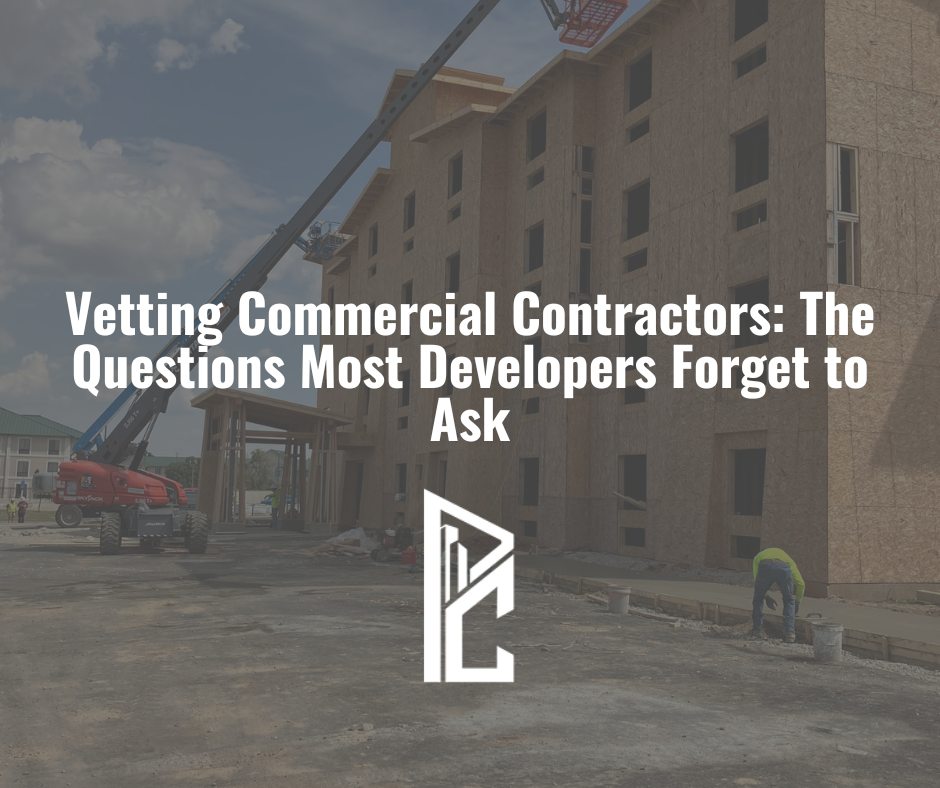
Vetting Commercial Contractors: The Questions Most Developers Forget to Ask
Choosing a commercial contractor isn’t like buying office supplies—you can’t just compare prices and pick the cheapest option. Yet too many developers approach contractor selection exactly that way, focusing solely on the bottom line while ignoring the questions that actually predict project success.
The right contractor becomes your partner in bringing your vision to life. The wrong one? They can turn your project into a budget-draining, timeline-busting nightmare that damages your reputation and tests your sanity.
After decades of commercial construction nationwide, we’ve seen what separates successful projects from disasters. The difference almost always comes down to asking the right questions before signing the contract—not after problems emerge.
Beyond the Basics: Experience Questions That Matter
Most developers ask about experience, but they ask the wrong way. “How long have you been in business?” tells you almost nothing. A contractor who’s been around for twenty years might have zero experience with your specific project type.
The Questions to Actually Ask:
“How many projects similar to mine have you completed in the past three years?”
Recent experience matters more than total years in business. Construction methods, materials, and regulations evolve. You want a contractor who’s currently active in your project type, not someone who built something similar a decade ago.
Recent experience matters more than total years in business. Construction methods, materials, and regulations evolve. You want a contractor who’s currently active in your project type, not someone who built something similar a decade ago.
“Can you walk me through a project like mine from start to finish?”
Listen carefully to their answer. Contractors with genuine experience will provide specific details about challenges, solutions, and processes. Vague generalities suggest they’re stretching their experience to fit your project.
Listen carefully to their answer. Contractors with genuine experience will provide specific details about challenges, solutions, and processes. Vague generalities suggest they’re stretching their experience to fit your project.
“What’s your experience with projects in this location?”
Local building codes, permitting processes, and inspection requirements vary dramatically. A contractor unfamiliar with your jurisdiction will face a steep learning curve—on your dime and timeline.
Local building codes, permitting processes, and inspection requirements vary dramatically. A contractor unfamiliar with your jurisdiction will face a steep learning curve—on your dime and timeline.
Financial Stability: The Questions Nobody Wants to Ask
Money conversations feel awkward, but financial instability is one of the fastest ways for projects to derail. Contractors who struggle financially cut corners, delay work, and sometimes abandon projects entirely.
Critical Financial Questions:
“What’s your bonding capacity?”
Bonding capacity indicates financial strength and project size capability. If their bonding capacity barely covers your project, you’re their biggest risk—and they’re yours.
“Can you provide a financial reference from your bank or surety?”
Legitimate contractors with solid finances won’t hesitate. Resistance to this question is a massive red flag.
“How do you structure payment schedules?”
Payment terms reveal a lot about how contractors operate. Be wary of anyone demanding large upfront payments or unusual payment structures.
Project Management: Who's Really Running Your Project?
The person you meet during the sales process often isn’t the person managing your project day-to-day. This disconnect causes more problems than almost any other factor in commercial construction.
Management Questions That Reveal Reality:
“Who will be my primary point of contact during construction?”
Then ask to meet that person before signing anything. If they can’t or won’t arrange this meeting, consider it a warning sign.
“How do you handle communication and reporting?”
Successful projects require consistent communication. Contractors should have clear systems for updates, issue resolution, and decision-making processes.
“What’s your superintendent’s experience with projects like mine?”
The superintendent manages your project daily. Their experience and competence matter as much as the company’s overall reputation.
“How many projects will my superintendent be managing simultaneously?”
Superintendents juggling too many projects can’t give yours adequate attention. You want focused oversight, not divided attention.
Quality Control: Beyond Promises to Processes
Every contractor promises quality work. Few have systematic processes to ensure it actually happens.
“Walk me through your quality control process.”
Look for specific systems, not general assurances. Professional contractors have documented procedures, regular inspections, and clear accountability.
“How do you handle defects or issues discovered during construction?”
The answer reveals their problem-solving approach and willingness to take responsibility.
“What warranties do you provide, and what do they actually cover?”
Read the fine print. Warranty terms vary dramatically, and exclusions can render impressive-sounding warranties nearly worthless.
“Can I visit current job sites?”
Seeing their work in progress tells you more than any portfolio of completed projects. Pay attention to site organization, safety practices, and how they treat subcontractors.
Problem-Solving Ability: The Most Important Questions
Problems happen on every construction project. What separates good contractors from great ones is how they handle inevitable challenges.
Questions That Reveal Problem-Solving Capability:
“Tell me about a project that didn’t go as planned. What happened, and how did you handle it?”
This question is gold. Contractors who claim they’ve never had problems are either lying or haven’t done enough work to encounter real challenges. Listen for accountability, creative problem-solving, and lessons learned.
“How do you handle unexpected site conditions?”
Surprises happen—underground utilities, soil issues, hidden structural problems. You want a contractor who addresses them efficiently rather than using them as excuses for delays and overages.
“What’s your change order process?”
Change orders are inevitable, but the process shouldn’t be painful. Clear procedures prevent disputes and keep projects moving.
References: Asking the Right Follow-Up Questions
Most developers ask for references but don’t dig deep enough when calling them.
What to Ask References:
“Did the project finish on time and on budget?”
Then ask follow-up questions about any delays or overages. Understanding why they happened reveals how the contractor handles challenges.
“How did they handle problems or unexpected issues?”
This question often reveals more than asking about overall satisfaction.
“Would you hire them again?”
Simple, direct, and telling. If there’s hesitation, probe deeper.
“What advice would you give me about working with this contractor?”
This open-ended question often surfaces insights you wouldn’t get from direct questions.
Red Flags: Warning Signs to Never Ignore
Some answers should immediately raise concerns:
- Vague responses lacking specific details suggest limited actual experience with your project type.
- Pressure to sign quickly or claims that pricing is only available for a limited time indicate desperation or manipulation.
- Reluctance to provide references or difficulty reaching provided references suggests problems they’re hiding.
- Unrealistic promises about timelines or budgets that seem too good compared to other bids usually are too good to be true.
- Poor communication during the vetting process won’t magically improve once you’re under contract.
Trust Your Gut—But Verify Everything
Intuition matters in contractor selection, but it shouldn’t be your only guide. The most charming salesperson might represent a company with serious operational problems. Conversely, a less polished presentation might come from a contractor who focuses on execution rather than sales.
The questions you ask—and the answers you receive—provide the data you need to make an informed decision. Take time to ask them thoroughly, listen carefully to responses, and verify what you hear through references and research.
Your commercial project deserves a contractor who brings expertise, financial stability, systematic processes, and proven problem-solving ability. The right questions help you find that partner before you’re contractually committed.
Let's Build Something Great Together
Choosing the right commercial contractor sets the foundation for project success. At Pro Commercial, we welcome tough questions because we have solid answers backed by decades of nationwide experience.
Ready to discuss your project? Let’s talk.
